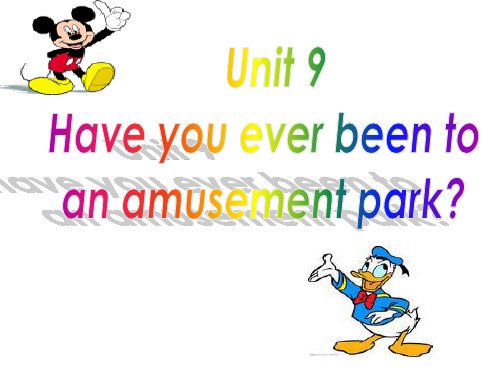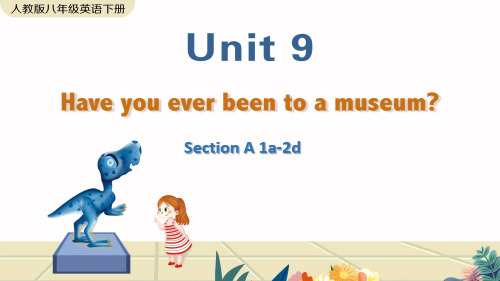初中英语人教版八年级下册Unit9 SectionA 第一课时
- 格式:doc
- 大小:33.50 KB
- 文档页数:4






答卷时应注意事项1、拿到试卷,要认真仔细的先填好自己的考生信息。
2、拿到试卷不要提笔就写,先大致的浏览一遍,有多少大题,每个大题里有几个小题,有什么题型,哪些容易,哪些难,做到心里有底;3、审题,每个题目都要多读几遍,不仅要读大题,还要读小题,不放过每一个字,遇到暂时弄不懂题意的题目,手指点读,多读几遍题目,就能理解题意了;容易混乱的地方也应该多读几遍,比如从小到大,从左到右这样的题;4、每个题目做完了以后,把自己的手从试卷上完全移开,好好的看看有没有被自己的手臂挡住而遗漏的题;试卷第1页和第2页上下衔接的地方一定要注意,仔细看看有没有遗漏的小题;5、中途遇到真的解决不了的难题,注意安排好时间,先把后面会做的做完,再来重新读题,结合平时课堂上所学的知识,解答难题;一定要镇定,不能因此慌了手脚,影响下面的答题;6、卷面要清洁,字迹要清工整,非常重要;7、做完的试卷要检查,这样可以发现刚才可能留下的错误或是可以检查是否有漏题,检查的时候,用手指点读题目,不要管自己的答案,重新分析题意,所有计算题重新计算,判断题重新判断,填空题重新填空,之后把检查的结果与先前做的结果进行对比分析。
亲爱的小朋友,你们好!经过两个月的学习,你们一定有不小的收获吧,用你的自信和智慧,认真答题,相信你一定会闯关成功。
相信你是最棒的!Unit9Have you ever been to a museum?Period1(Section A1a-2d)一、词组翻译1.去某个不同的地方________________________________________________________________________ 2.一个做……的好方法________________________________________________________________________ 3.乘坐地铁________________________________________________________________________ 4.玩得开心________________________________________________________________________ 5.去溜冰________________________________________________________________________ 6.学到很多关于发明物的知识________________________________________________________________________ 7.引领走向彩色电影________________________________________________________________________ 8.搭起帐篷________________________________________________________________________ 9.在山上露营________________________________________________________________________ 10.曾经去过……________________________________________________________________________二、完形填空Nobody's journey is smooth.Life is__1__with unexpected things.So when you are in __2__,don't lose heart.If you can__3__at your life,everything will be OK.Here is a story about it.At the age of four,Allman fell off a train and his__4__were badly hurt.Since then,he couldsee__5__.It would be wonderful to see again,but bad luck might not be always bad.In fact,__6__Allman became blind,he learned to love his life more.But he had a hard time before he was__7__.The hardest thing was to__8__himself and it had to start with the simplest things.One day,a girl gave Allman a__9__.He thought she was__10__him.“I can't use it,”he said.“Take it with you and roll it around,”the girl smiled and said.__11__words got into his head.“Roll it around!”By rolling the ball Allman could hear__12__it went.This gave him an idea to do something he__13__thought of—playing baseball.Years after that,he__14__a successful game of baseball for the blind.He__15__it ground ball.From then on,Allman began to smile at life and achieve more.()1.A.filled B.covered C.full D.lot()2.A.help B.difficult C.hard D.trouble()3.A.cry B.smile C.laugh D.learn()4.A.nose B.mouth C.eyes D.arms()5.A.anything B.something C.nothing D.everything()6.A.and B.but C.although D.so()7.A.forgetful B.beautiful C.useful D.successful()8.A.believe B.tell C.trust D.make()9.A.map B.book C.baseball D.telephone()10.A.fool B.fools C.fooled D.fooling()11.A.Her B.She C.His D.He()12.A.what B.who C.why D.where()13.A.ever B.even C.always D.never()14.A.discovered B.invented C.achieved D.enjoyed()15.A.called B.said C.spoke D.told三、阅读理解Have you ever been to the forest alone or with your friends during your holiday?If you go into the forest with your friends,stay with them.If you don't,you may get lost.If you really get lost,this is what you should do.Sit down and stay where you are.Don't try to find your friends—let them find you by staying in one place.There is another way to help your friends or other nearby people to find you.Give them a signal(信号)by shouting or whistling(吹口哨)three times.Stop.Then shout or whistle three times.Any signal given three times is a call for help.Keep on the shouting or whistling,always three times together.When people hear you,they will know that you are not just making noise for fun.They will let you know that they have heard your signal.They will give two shouts,two whistles or two gun shots.When someone gives such a signal,it is an answer to a call for help.If you don't think that you will get help before night comes,try to make a little house with branches(树枝).Make yourself a soft bed with leaves and grass.What should you do if you get hungry or need drinking water?You would have to leave your little branch house to look for a river.Don't just walk away.Pick off small branches and drop them as you walk so that you can find your way back.()1.If you get lost in the forest,you'd better________.A.try your best to find the way outB.walk around and try to find somebody elseC.stay in one place and get some sleepD.stay in one place and give signals for help()2.You keep on shouting or whistling three times together________.A.to make sure someone else could hear youB.because you can let others follow youC.to let people believe that you need helpD.because it is an answer to a call for help()3.If you want to help people who________,you should give two shouts,two whistles or two gun shots for answer.A.try to find a river in the forestB.give three shouts or whistles together every timeC.feel very hungry and tiredD.shout first then whistle and shoot at last()4.If you are not sure that you can get help before night comes,you should________ first.A.make a little house to stay B.try to find something to eatC.make a soft bed with leaves and grass D.try to find a river to get some water ()5.This passage mainly tells us________.A.what to do when we get lost in the forestB.how to make signals in the forestC.what we should eat when we are in the forestD.how to make a simple house in the forest四、根据句意及首字母或汉语提示完成句子1.I'd like to go________(某处)interesting this weekend.2.Can I use your c________?I want to take some pictures.3.The________(发明)of the computer is a great achievement.4.Last night we went to the a________park and we took the merry-go-round(旋转木马).五、用have/has been或have/has gone填空1.—Where________she________?—She________to the library.2.My friend________to Shanghai to have a meeting.He________there twice.3.Miss Gao isn't in.She________to the office.4.The Blacks________back to their country and won't be back until next autumn.5.—Where is Jack?—He________to Wuhan.6.—________you ever________to Japan?—No,never.7.How long________Tom________in Nanjing?8.I________never________to the Great Wall.六、语法填空阅读下面短文,按照句子结构的语法性和上下文连贯的要求,在空格处填入一个适当的词或使用括号中词语的正确形式填空(每空不多于3个单词)。
Unit 9 Have you ever been to a museum?Period One (Section A 1a-2d)Teaching aims:Key words:amusement, somewhere camera ,invention.Key phrases:have been to,somewhere different,have a great time,take the subway,learn about,put upKey sentences:-- Have you ever been to a science museum?--No,I haven’t.--Me neither.Grammar:The use of “present perfect tense ”Teaching procedures:Step 1 GreetingsGreet the students as usualStep 2 Lead in:T: Nice to meet you, everyone.SS:Nice to meet you, too.T:Where did you go last year?S1:I went to......T:Where else did you go?S1: I went to......T: Have you ever been to……?S1: Yes, I have. (help the student to answer this way )T: When did you go there?S1: I went there…..T: ( asks more students )S2: No, I haven’t. (Help the student to answer this way )(Note: Ask more students to answer the questions above, if the same negative answer, help answer “me neither”)Step 3 Teaching aimsPresent the teaching aims on the blackboard or on the screen. Let them know what they will learn.Step 4 Self learning (I)1. Tell the students to learn the phrases and key sentences by themselves.2. Finish 1a: Which of these places would you like to visit? Rank them from 1 to 6.Answers vary.Step 5 ListenBefore listen, students read the statements in 1b, 2a and 2b, understand the requests.Play the tape the first time, students only listen.Play the tape the second time, finish the exercises .Listen to the tape once more, students repeat after the tape, check their answers.Step 6 Presentation1.Pairwork1: Practice the conversation in 1c, discuss it, and thenmake similar conversations in pairs.2. Pairwork2: Ask the students to read the conversation in 2c. Then two students make a similar conversation about themselves. Then the students work in pairs.Step 7 Self-study(Ⅱ)Ask the students to learn 2d by themselves and finish the tasks of self-study.Task 1: Read the conversation in 2d aloud and then understand its Chinese meaning and find out the importances and difficulties by yourselves.Task 2: Read 2d together in groups and then discuss the key points and solve the difficulties.Task3: Role-play the conversation with groups.Step 8 Explain and Extension知识点讲解:1. 现在完成时的构成:“_____/ _____ + _____”构成。
Unit 9 Have you ever been to a museum? Section A 1 (1a-2d)教学目标1. Knowledge and Ability Objects(1) Key vocabulary: amusement; neither(2) Listening practice.(3) Target language:1.Lets' go somewhere different today.2.Have you ever been to…? Yes, I have./ No, I haven’t.3.How about/what about…?4.How are we going to get there?5.We can take the subway/…(4) To train students’listening and speaking skills.2. Method Objects in Teaching(1) Scene teaching method.(2) Listening and speaking methods.(3) Pair work.3. Sensibility and Value情感态度与价值观To be interested in taking part in all kinds of activities in English class. 教材分析Teaching Key Points教学重点1. Key vocabulary in this period.2. Target language in this period.Teaching Difficulty教学难点Make conversations freely using the target language.Teaching Aids教学手段1. A tape recorder.2. A computer for multimedia use.Teaching Procedures教学步骤Step 1 Greetings and RevisionGreet the class and check the homework.Step 2 Lead-in导入1. Guess the places of the pictures; they are the British Museum, space museum, history museum, water park, zoo, amusement park while lead in sentence patterns:“Have you ever been to …?”2. SpeakingGet students to work in pairs to practice the conversation: “Have you ever been to…”“Yes, I have”/ Not, I haven’t.Step 3 Pre-listening1. Section A 1aT: OK. Now open your books on Page 65. In Part 1a, 6 places are given. Please read the names of these places. (Teacher writes the names on the blackboard.) Which of these places would you like to visit? Rank them from 1 to 5.2. Talk about the pictureStep 4 ListeningListen and choose the best answer. The first and the second question aim to listening to time, and the third one aims to listen for the relationship. This activity trains students’listening ability for listening for specific relationship.Answer: CCA2.Listen again. Listen and check the boxes. Have these students ever been to these places?Step 5 SpeakingAsk and answer in pairs:A: let’s go somewhere different today.B: OK. Where do you want to go?A: Have you ever been to the space museum?B: No, I haven’t. How about you?A: …Step 6 Listening 2a 2b1.Listen and circle the places that you hear.2.Listen again and circle T for true or F for false.3.Speaking1.Look at the map in 2a and make conversations about the places.2.Role-play the conversation in 2d.Step 7 Language points 总结1. I learned about the inventions that led to color movies, too. 我还了解了一些发明,它们成就了彩色电影。
Unit 9 Have you ever been to a museum?
Section A (1a--1c) (第1课时)预习材料
.班级:姓名:主备人:俞友李审核人:俞友李时间:【教师寄语】:Well begun, half done. 好的开始等于成功的一半
一.预习目标:
1. 熟练掌握以下词汇:
amusement park somewhere space museum history museum art museum water park
2. 熟练掌握重点句子:
1)Have you ever been to a science museum?
2)Me neither.
3) Let's go somewhere different today.
二.预习方法:
1.根据重难点理解文中对话含义。
2.熟读并牢记课文重点单词,然后完成预习自测题目。
三.知识点拨:
1. Have you ever been to a museum?
你去过博物馆吗?
“have/has been to+地点”意为“曾经去过某地”、现已不在那里,常和just, never, ever等词连用。
后也可接次数, 如once, twice, three times等, 表示“去过某地几次”。
I have been to Mount Huang. 我曾去过黄山。
He has been to Mount Huang twice. 他去过黄山两次。
2.—Have you ever been to a history museum?
—No,I haven’t.
—Me neither.
这里Me neither.是Neither have I.的口语化。
“Neither+助动词/情态动词/be动词+主语.”表示主语的情况与上述否定句中所说内容一样,是省略句型,Me neither.是Me,too.的否定形式。
He is not a doctor.Me neither./Neither am I.他不是医生。
我也不是。
【拓展】“So+助动词/be动词/情态动词+主语I.”相当于Me,too.
They have been to England.So have I.(Me,too.) 他们去过英国。
我也去过。
【注意】Me neither.的上一句应为否定句。
Me,too.的上一句应为肯定句。
3.Let’s go somewhere different today.
somewhere adv.在某处;到某处。
形容词修饰somewhere,形容词要后置。
【辨析】somewhere和anywhere
(1)somewhere意为“某处,在某处”,强调在一个地方,用于肯定句。
I met her somewhere last year.
(2)anywhere意为“在什么地方,任何地方”,常用于否定句/疑问句。
Did you go anywhere last Sunday?
四.预习检测:
(一)、英汉互译。
1.游乐场
2.水上公园
3.美术馆
4.历史博物馆
5.太空博物馆
6.科学博物馆
7.一些不同的地方
8.have been to____________________9.How about you?_____________________ (二)、根据汉语,补全句子。
1.我去过北京两次。
I _______ _______ _______Beijing twice.
2.昨天他没有去那,我也没去。
He didn’t go there yesterday. ______________. (三)、单选。
()1. —Have you ever been to an aquarium?
—No, _____.
A. I have
B. I am not
C. I haven’t
D. I hasn’t
()2. —I’ve never been to a water park.
— _______
A. Me, too
B. Me neither.
C. Me also.
D. Me both.
(四)、选用have, has填空。
1. I _______ told him the news.
2. She ________ come back from school.
3. You ________ won the game.
(五)、按要求改写下列各句。
1. They have bought a computer. (改成否定句)
2.He has lost his book. (先改成一般疑问句,再作肯定和否定回答)
?
预习的收获
预习的困惑
Unit 9 Have you ever been to a museum?
Section A (1a--1c) (第1课时)课堂材料
.班级:姓名:主备人:俞友李审核人:俞友李时间:一.单项填空。
()1.—_________ you ever_________ the science museum?
—No, I haven’t.
A.Do; visit
B.Have; visited
C.Did; visit
D.Are; visiting
()2.—Where would you like to go on your summer vacation, Mike?
—I’d like to go_________.
A.nowhere interesting
B.interesting anywhere
C.somewhere interesting
D.interesting somewhere
()3.What about_________ a rest?
A.to have
B.have
C.has
D.having
()4. —I can sing the song in English.
—________.
A. So I can
B. So can I
C. Neither can I
D. Neither I can
( )5.Have you ever been to ___ amusement park?
A. a
B. an
C. the
D. /
二.按要求完成下列句子,每空一词。
1.He has been to Feifan Middle School.(改为一般疑问句)
________he________to Feifan Middle School?
2.I have been to the art museum.(对划线部分提问)
Where________you________?
3.She hasn’t finished homework and I haven’t,either.(同义句转换)
She hasn’t finished homework and ________ ________.
三、根据对话内容,从方框中选择恰当的选项补全对话。
A: Hey, hey, John! This Saturday we’ll go to the art museum again, right?
B: Oh, no! (1)________
A: Where do you want to go?
B: I want to go to the water park. (2)________
A: No, never.
B: (3)________
A: Sure, I’d love to. I think it must be a great way to spend Sat urday.
B: I also think so.
A: (4)________
B: Neither. How about riding a bike?
My dear students, believe you can do it well! Come on!
整洁度% 成绩日期。